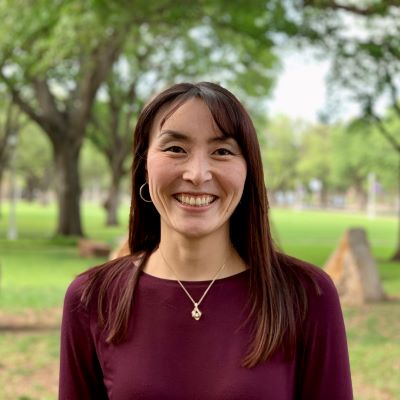 In celebration of Asian/Pacific American Heritage Month, the College of Education
is highlighting some outstanding Asian American students. Read on to learn more about
Cassandra Cartmill, a Science Education doctoral student whose research focuses on
how Asian American women in Science Ph.D. programs grow in their identities.
In celebration of Asian/Pacific American Heritage Month, the College of Education
is highlighting some outstanding Asian American students. Read on to learn more about
Cassandra Cartmill, a Science Education doctoral student whose research focuses on
how Asian American women in Science Ph.D. programs grow in their identities.
What is your background and what brought you to TCU?
My background is in biology with a molecular biology emphasis from Texas Lutheran University. I taught Biology and Chemistry for 10 years. I knew I would go back to college at some point, but I felt I wouldn’t be seen a good candidate in the sciences because I came from teaching instead of research or an industry field. I landed in public health and went to the Health Science Center in Fort Worth. My advisor was Dr. Katherine Fogelberg, who graduated from the Science Education program under Dr. Weinburgh. I was curious about why some professors were really good at teaching science and how they were prepared to teach, so Katherine recommended that I look into the Science Education program at TCU.
What’s your favorite thing about your program at TCU?
I like that it’s small and our professors get to know us – not just science education professors, but any professor you have a class with. Even if your class is 20 or three, they know YOU. I enjoy the flexibility of our program. The assignments are written to be very open, so it allows you to figure out what little niche you want to explore.
Tell us about your research. How did you become interested in it, why is it important?
When Katherine introduced herself in class, several things clicked with me: she’s Asian American and she’s a Korean adoptee to white parents…those are things that I am, too. It got me to thinking about the first time I ever had an Asian teacher, which was in seventh grade. Katherine was the only other Asian woman teacher I’ve ever had since then (plus a few in my Master’s program who were men).
When I got to TCU, I met Ying, Shelly, and Franchesca – all Asian American women. We have so many common experiences—for example, we all get asked “Where are you from?”, which is a problematic question because the expectation is that we must be from outside of the U.S. Yet, our experiences vary tremendously.
If it wasn’t for my group of colleagues and friends Ying, Katherine, Franchesca, and Shelly—my Asian Sisters—I don’t think this dissertation would have come to be. Specifically, I’m looking at Asian American women in Science Ph.D. programs in the U.S., and I’m really interested in the experiences they have had before and during their program that contributes to how they see themselves. It has been so fascinating listening to their disparate, yet similar, stories!
I think this research is important for those who want to be professors—how do we help them professional develop to create inclusive classrooms for all students? Secondly, I think it’s important for current professors to recognize that their Asian American students are very different and should learn about each student’s lived experiences, so that they can learn how to mentor these students in ways that make them successful.
What’s the best part about being a Horned Frog?
It doesn’t matter if you’re a scholar, student, peer, or a faculty member – the culture around TCU is that “we want you to be better,” and that helps YOU want to be better. TCU wants to attract different kinds of people and types of talent, not just with their students, but with faculty and staff. The College of Education is a good example of a community that cares. They strive to be the best they can be, are willing to admit when they don’t know something, and seek feedback from their colleagues and students.
What’s next?
I have a job through August, and then I don’t know! I’ve gained a lot of knowledge and interest in DEI through my internships, and that’s the space I’m hoping to move into at some point, in addition to learning and development.